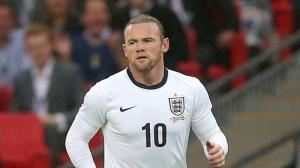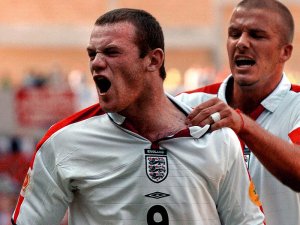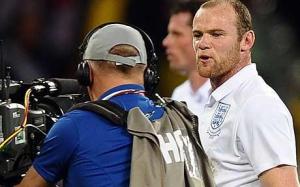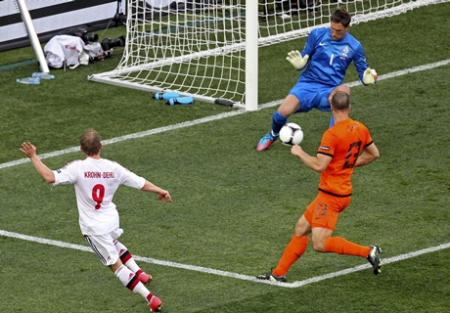Wayne Rooney’s career has had some highs and lows. Several of his lows, have been whilst wearing the England jersey. And now with the 2014 World Cup in Brazil less than 2 months away, I take a look at Rooney’s place in the England eleven.
Tournament Experience
Rooney, now at the age of 28, has played in 4 major international tournaments. The only tournament in which he performed well, was his breakthrough tournament – Euro 2004. In Portugal, a young Rooney showed a real hunger, raw ability as well as great athleticism in helping England to the Quarter-Finals. He scored 4 goals and was named in UEFA’s team of the tournament.
However, his England career since has flattered to deceive on the biggest stages. His qualifying campaigns haven’t been too bad. He has been England’s top-scorer in qualifying for the last two World Cups. He hit 9 goals in qualifying for the 2010 World Cup and 7 goals in qualifying for this summer’s World Cup. But his personal performances in the major tournaments since that 2004 breakthrough have been disappointing.
In the World Cup in 2006 he was taken in the squad despite not being fit after a metatarsal injury in one of the final league games of his Manchester United season. When he was introduced to the team his performances were lacklustre and he was red carded in the Quarter-Final defeat to Portugal.
In 2010, the World Cup in South Africa actually saw Rooney criticise England fans in a rant into a TV camera as he walked off the pitch after a poor performance in drawing 0-0 to Algeria. Rooney was disappointing in the tournament and England were thrashed 4-1 by Germany in the 2nd round.
Before the European Championships of 2012, there was much debate over whether Rooney should’ve been included in England’s squad. This was due to the fact that Rooney was suspended for the first two group games. Roy Hodgson selected him and he went straight into the team when he became available. Despite scoring the only goal in the final group game against Ukraine, Rooney’s performances in that and the Italy game in the Quarter-Finals were still underwhelming.
World Class?
I’m not suggesting Rooney should be left out of the squad altogether. Neither is this a piece to write off his talents altogether. He is a good player. He doesn’t possess the same burst of acceleration to take him away from defenders as he did so often in his excellent Euro 2004 campaign. But he remains a good player. However, I don’t go along with the Sky pundits and tabloid writers that repeatedly ram it down our throats that he is “world class”. Obviously that is a difficult term to try and define. But Rooney hasn’t performed against top opposition in a way that would actually suggest he is anywhere near the same level as Messi and Ronaldo.
At one stage, Rooney may have been considered Ronaldo’s equal at Manchester United, but Ronaldo usurped him and eventually took over his position in the team, with Rooney having to play wide to keep a place in the team. In Alex Ferguson’s last couple of seasons, he would often leave Rooney out of his line-up for big games against the best sides. So did the Premier League’s most successful manager see a player in decline?
More recently, Rooney has come under scrutiny after signing a deal for a reported £300,000 per week. For me, the only issue with that was how he, for a second time in just a few years, appears to have threatened to leave in order to engineer a massive pay-rise. But my opinions on the matter in hand aren’t affected by this. Manchester United can pay him whatever they like. And their supporters still idolise him despite his two half-hearted attempts at leaving the club.
What has been apparent this season is that Rooney has been poor in most of the games against ‘top 5′ opposition. He’s played in 8 league matches against this season’s top 5 (Liverpool, Chelsea, Manchester City, Arsenal & Everton) and scored just 1 goal.
I’d also point to games in the latter stages of the UEFA Champions League. Away to Olympiakos in February, Rooney was poor. Again in the away leg in the tie against Bayern Munich, Rooney was wasteful in possession, struggled to control the ball at times, and didn’t offer any attacking outlet for Moyes’ team, before eventually being moved back into midfield. Granted, Rooney may not have been 100% fit in this game, but if that was the case he shouldn’t have played.
My belief is that Rooney no longer does enough against good opposition, to merit the status as England’s talisman and being the automatic-pick he seems to be for the starting eleven.
The Present England
Currently, England seem to have plenty of options in terms of attacking players.
With several young players emerging as genuine talent in this season’s Premier League, Roy Hodgson has a bigger pool of quality attacking players to choose from. Daniel Sturridge, Ross Barkley, Andros Townsend, Raheem Sterling and Adam Lallana have all shown they’re capable of playing for England since the last international tournament. Add to those Alex Oxlade-Chamberlain, Theo Walcott, Jay Rodriguez and Danny Welbeck, and there is a very youthful and dynamic group of attacking players for England to choose from.
Rooney is still part of this group. Of course he should go to Brazil. In terms of actual strikers, there isn’t much real quality behind Rooney and Liverpool’s Daniel Sturridge. Jermain Defoe’s transfer abroad could’ve scuppered his chances and Andy Carroll has spent most of the season injured. The only English striker to have enhanced his reputation in the last 2 years (besides Sturridge) is Ricky Lambert. So there isn’t a great deal to choose from in terms of centre-forwards.
Square Pegs, Round Holes
What I would be hoping Roy Hodgson will do, is choose a system that will give England the best chance of success, and then select the best/in-form players for each position. For too long, England sides have just tried to get all the big-name players into a team, even if it meant forcing players to play unfamiliar roles or unsettling the balance of the side.
The most criminal example of this was forcing Paul Scholes to play left midfield in a 4-4-2 to accommodate the inclusion of Frank Lampard. Also, the persistence for years in playing Gerrard and Lampard in a central midfield partnership, when other countries would have chosen one of them to play at a time, alongside a more disciplined midfielder. This approach of putting square pegs into round holes is possibly through pressure from the English press, and managers not wanting (or being brave enough) to leave out a “big name”.
If England are to get anywhere in a major international tournament, we have to place a team ethic above individual ego’s. The so-called ‘star names’ don’t all have to be in the team if form or the system being used dictates.
Not many countries in the world cup will be starting games with 2 strikers in traditional centre-forward roles. This seems to be a thing of the past in the modern game and England themselves have finally begun to adapt in the last couple of years. If Hodgson does go with a single central striker, it is likely it will be either with two wide forwards on either side (4-3-3), or with three attacking players with a bit of freedom behind the striker (4-2-3-1). Both of these systems have been used by Hodgson in the last year or so.
The question then becomes – where does this leave Wayne Rooney?
If we’re looking at having one central striker, surely we should go with the man who has been THE outstanding English striker in the Premier League this season. With 20 goals in 26 league games, that man is Daniel Sturridge. It is not only Sturridge’s goals that have impressed. His great level of confidence and self-belief is rare in England internationals. He is skilful, quick, creative and able to beat a player in a 1v1 situation.
What would be a travesty (yet sadly I can see it happening) is Rooney playing centre-forward while Sturridge is forced to play out wide. This would be a waste of Sturridge’s talents and another case of putting square pegs into round holes to avoid making a big decision by leaving someone out.
Options
The options for Hodgson include playing Rooney wide with Sturridge up top, playing Rooney in the middle of the 3 in the 4-2-3-1, playing Rooney up top with Sturridge wide or on the bench, or leaving Rooney out.
Personally, I don’t see an argument for not playing Sturridge at the head of the attacking line-up. That leaves Rooney fighting for a place deeper in the team, or competing with Sturridge for that starting place and coming off the bench when needed. Currently, Rooney’s form isn’t so good that you would feel a huge need to have him in the starting line-up. And his ability to pick the ball up deep, turn and attack seems to have deserted him as he’s lost that dynamic edge he had earlier in his career.
So to have him in a central role at the head of an attacking midfield area, in my opinion, wouldn’t utilise the attributes he currently has. I’d rather see someone with the intelligence and fluidity of movement of an Adam Lallana, an Oxlade-Chamberlain or a Ross Barkley in that kind of a role.
To have Rooney in a wide attacking role makes even less sense. The apparent strengths that the modern England team will have, include being able to counter-attack quickly and have pacey, confident dribblers on the flanks. With the likes of Andros Townsend, Raheem Sterling, Oxlade-Chamberlain and even Danny Welbeck who is often used in a wide attacking role all available, they would all be better options for the good of the team in such a position.
Rooney’s Role
So with Rooney not in good club form (another poor display in the Easter Sunday game at Goodison Park), and with it being 10 years since his last positive impact at an international tournament, the time to leave him out of the starting line-up is now. Of course I would still take him in the squad. But I’d have him competing with Sturridge for that central striking role.
I expect to be disappointed by Hodgson not being brave enough to leave out a player that the press/media have spent years hyping up. But it would be a great signal of intent to move England forward into a new era, if Hodgson goes with a more youthful, fearless and skilful attack, all without ego and willing to put the team first.
Further ahead, Rooney will be 30 by the time the next European Championships come around. That will probably be his last chance to play in a major tournament in his prime. He shouldn’t be written off as an England regular, but as he may need to adapt his game. At present I don’t see him playing in the no.10 role he once did. He appears to me to be more of a no.9, without the quick movement between the lines and combination of strength and speed that saw him picking up the ball deep and running at defences in Euro 2004 all those years ago. Many have suggested that he would convert to be a central midfielder in his later years. That may be something he does depending on his club manager, but there would be doubts around whether he could find a new position and be competent enough with it to be international class in a new role.
So Mr Hodgson, leave Rooney out of the starting eleven, for the good of the present England team.














